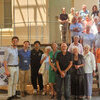Vision 2030: The world is changing, are we?
17 August 2020 | Story Natalie Simon. Photo Lerato Maduna. Read time 7 min.
“Vision 2030 is an invitation to innovate,” said the University of Cape Town (UCT) Vice-Chancellor Professor Mamokgethi Phakeng. “As we look towards the future we need to think not only of the problems of the past, but also look beyond our current context. We must ask ourselves the question: the world is changing, are we?”
Phakeng was speaking at the second virtual staff engagement, hosted by the vice-chancellor and her executive, Deputy Vice-Chancellor for Research and Internationalisation, Professor Sue Harrison; Deputy Vice-Chancellor for Teaching and Learning, Associate Professor Lis Lange; Deputy Vice-Chancellor for Transformation, Professor Loretta Feris; and chief operating officer, Dr Reno Morar, in which the new institutional strategy titled Vision 2030 was presented as part of the process of engagement before the strategy is finalised.
The executive stressed the consultative nature of the work done in drafting the strategy. Over 100 members of the university community, including academic, and professional, administrative and support services (PASS) staff were involved.
Research solving Afrika’s problems
One of the key goals of the strategy is “research solving Afrika’s problems that contributes to global knowledge”.
“This focuses us in on the complex problems of today and the future,” said Harrison. “The problems faced on the continent are socially relevant and cut across a number of fields and disciplines. The solution to these problems will thus require interdisciplinary action and expertise.”
There, however, remains a recognition that excellent interdisciplinary research must be built on a strong disciplinary foundation. Solutions to the grand challenge problems facing Afrika require partnerships, and this is key to the research strategy for Vision 2030, she said.
“We will address our massive transformation purpose, which is to unleash knowledge in and from Afrika to redefine and co-create a sustainable, global future.”
“These partnerships will begin within the university across our departments and faculties and will extend out to industry, government, non-governmental organisations and academic colleagues nationally, on the continent and globally.”
This research needs to be supported by excellent integrated research facilities and effective and innovative research management. It is through these and other measures, Harrison said, that excellence in research will continue to be enabled at UCT.
“And through this we will address our massive transformation purpose, which is to unleash knowledge in and from Afrika to redefine and co-create a sustainable, global future.”
UCT as an inclusive home for all
Members of the audience asked how those who feel excluded at the institution can embed this vision into their everyday jobs.
“We have a past that has made a group of people in our community feel excluded. We now have put things in place to work at making sure that everyone feels part of the community of UCT,” said Phakeng.
Feris spoke about the process of engagement taking place at the university, not only for Vision 2030, but also through the implementation of the inclusivity strategy. Opportunities to engage will take place across the university – down to departmental level.
“This is your invitation to say not only how you feel excluded, but also how you want to be driving the agenda,” said Feris. “This is an opportunity to claim your agency and to say, ‘This is the way I want to be part of this institution, and this is the way in which I think the university should address this.’ ”
“Both in the academic and in the PASS staff space, we have to do things differently, innovatively and creatively.”
One question touched on the separation of PASS and academic staff. Lange spoke of the intentional strategy to overcome this divide at the institution by integrating PASS and academic staff into the development of the strategy. Morar also emphasised the important role PASS staff play in the academic project.
“We have been pushed into a digitally enabled world,” said Morar. “Both in the academic and in the PASS staff space, we have to do things differently, innovatively and creatively.
“We already have a lot of creative energy coming through the PASS departments in support of the academic project.”
Is the future online?
One question touched on the future of brick-and-mortar universities and whether it is likely that UCT will be offering teaching and learning completely online by 2030.
“The current experience is telling us the direction in which we are moving,” said Lange. She said the future is most likely blended, particularly at the undergraduate level.
“UCT is the kind of university where students come to get the full UCT experience,” she said. “We have to figure out what are the elements of this experience that can be online and what are those where students will need to be on campus.”
A final question addressed concerns about job security in a future where online learning was the norm. Both Lange and Harrison noted that online learning remains as interactive and labour intensive as face-to-face learning.
“I do not foresee that we are going to need fewer people,” said Lange. “On the contrary, we will probably need more. What we need to do is make ourselves sustainable financially to expand as and when necessary in the future.”
Finding opportunity in an uncertain world
“The future is uncertain,” said Phakeng. She warned the audience to not let that uncertainty distract them. “Rather focus on the opportunity to do new things, to create and to innovate to take the university forward.”
In conclusion Phakeng described Vision 2030 as an opportunity to dream, but said it is not going to be comfortable. It is going to be a disruptive experience as we shift the way we do things to make sure we continue to be a leading university.
“It is better for us to put ourselves into a state of discomfort,” she said, “than to be thrown into a crisis because we did not grab the moment when we had the chance.”
Visit the Vision 2030 website.
 This work is licensed under a Creative Commons Attribution-NoDerivatives 4.0 International License.
This work is licensed under a Creative Commons Attribution-NoDerivatives 4.0 International License.
Please view the republishing articles page for more information.




























































































































































































































































































































































































































































